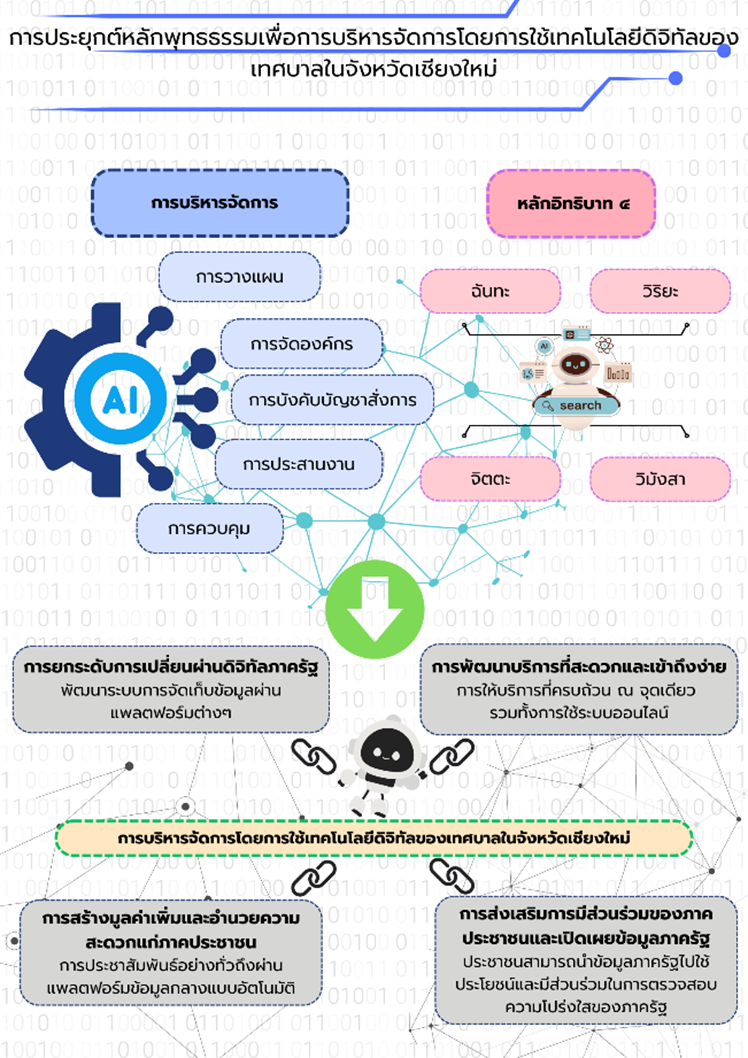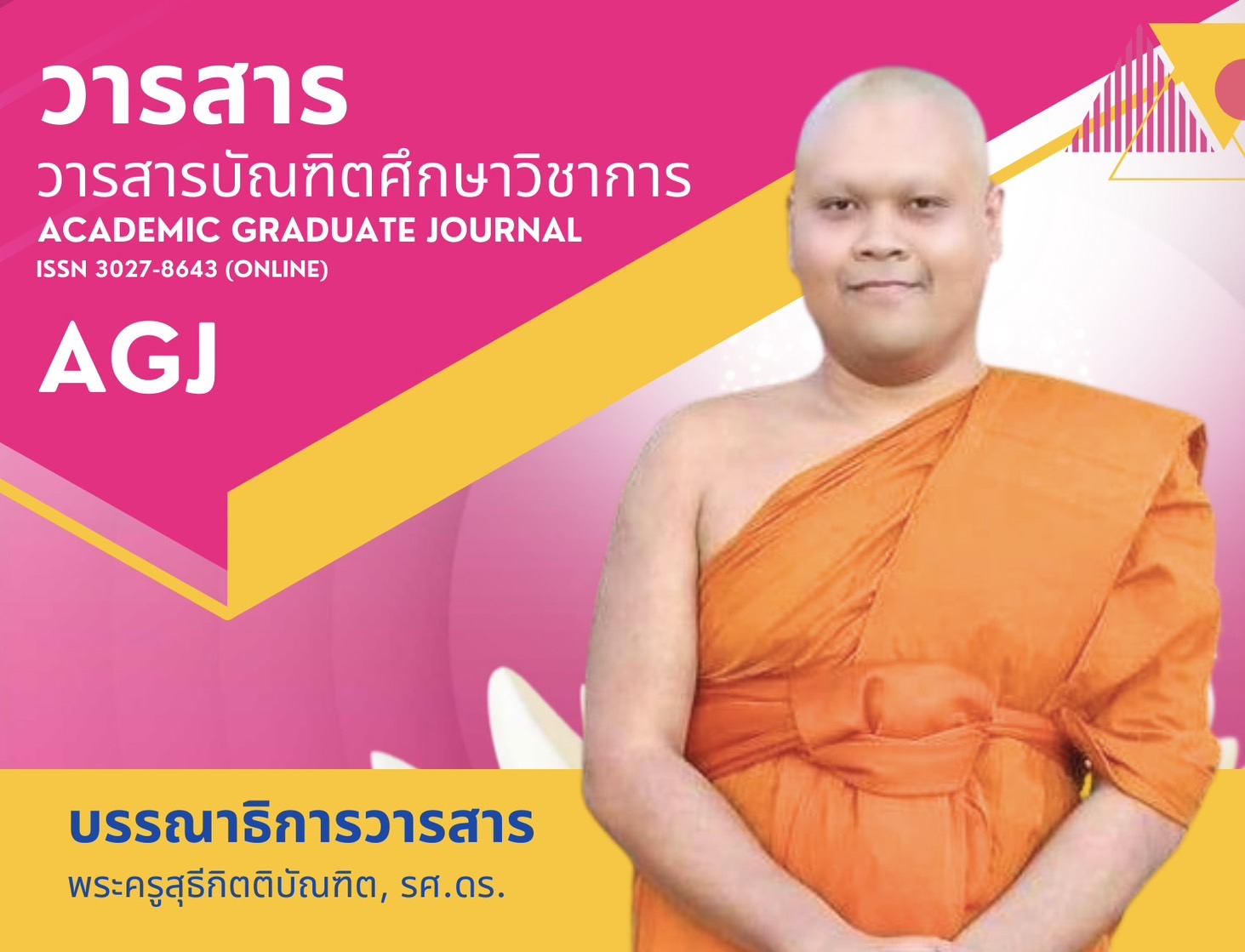BUDDHADHAMMA APPLICATION FOR MANAGEMENT USING DIGITAL TECHNOLOGY OF MUNICIPALITIES IN CHIANG MAI PROVINCE
Keywords:
Buddhist Principles, Public Administration, Digital TechnologyAbstract
This research article had the following objectives: 1. To study the management using digital technology of municipalities in Chiang Mai Province. 2. To study the factors affecting the management using digital technology of municipalities in Chiang Mai Province. 3. To present the application of Buddhist principles for the management using digital technology of municipalities in Chiang Mai Province. The research was conducted using mixed methods. The quantitative research collected data from a sample group of 220 people using a questionnaire with an overall reliability value of 0.929. The qualitative research was conducted through in-depth interviews with 18 key informants. Then, the synthesized data from the research results were brought into a focus group discussion with 10 participants to confirm the study results.
The research findings revealed that: 1. The management using digital technology of municipalities in Chiang Mai Province, overall, was at a high level ( =3.56, S.D.=0.58) as follows: developing convenient and accessible services, enhancing digital transformation in the public sector, promoting public participation and disclosure of government data, and creating added value and convenience for the public sector. 2. The factors affecting the management using digital technology of municipalities in Chiang Mai Province found that: 1. Management, including organizing, commanding, coordinating, and planning, was statistically significant at the 0.01 level. And 2. The Four Iddhipada, namely investigation Vimamsa, Viriya, Citta, and Chanda, were at statistically significant levels of the 0.01 and 0.05. 3. The application of Buddhist principles for the management using digital technology of municipalities in Chiang Mai Province was found in four aspects: enhancing digital transformation in the public sector, developing convenient and accessible services, creating added value and convenience for the public sector, and promoting public participation and disclosure of government data.
References
จรูญศักดิ์ สุนทรเดชา. (2563). การพัฒนารูปแบบการเฝ้าระวังพฤติกรรมสุขภาพผู้สูงอายุด้วยระบบเทคโนโลยีสารสนเทศของโรงพยาบาลส่งเสริมสุขภาพตำบล (ดุษฎีนิพนธ์ปริญญาปรัชญาดุษฎีบัณฑิต สาขาวิชารัฐประศาสนศาสตร์). พระนครศรีอยุธยา: มหาวิทยาลัยมหาจุฬาลงกรณราชวิทยาลัย.
จักรกฤษ กมุทมาศ. (2565). แนวโน้มของการประยุกต์ใช้เทคโนโลยีดิจิทัลสำหรับการบริหารงานองค์กรปกครองส่วนท้องถิ่น: กรณีศึกษาเทศบาลในพื้นที่ขอนแก่นเมืองอัจฉริยะ. วารสารบริหารธุรกิจและการบัญชีมหาวิทยาลัยขอนแก่น, 6(3), 77–101.
จังหวัดเชียงใหม่. (ม.ป.ป.). ด้านการปกครอง. สืบค้น 15 กุมภาพันธ์ 2567, จาก https://praphapon0713.wordpress.com/การพัฒนาในด้านต่างๆ/ด้านการปกครอง/
ณัฏฐ์ณัชชา ไชยประเสริฐ. (2565). การบูรณาการหลักพุทธธรรมเพื่อส่งเสริมประสิทธิภาพการบริหารของบริษัท โทรคมนาคมแห่งชาติ จำกัด (มหาชน) (ดุษฎีนิพนธ์ปริญญาปรัชญาดุษฎีบัณฑิต สาขาวิชารัฐประศาสนศาสตร์). พระนครศรีอยุธยา: มหาวิทยาลัยมหาจุฬาลงกรณราชวิทยาลัย.
เทศบาลนครเชียงใหม่. (2566). แผนแม่บทเทคโนโลยีสารสนเทศ พ.ศ. 2566–2570. เชียงใหม่: เทศบาลนครเชียงใหม่.
ธงชัย คล้ายแสง. (2562). การพัฒนาการท่องเที่ยวเชิงกีฬาโดยการบูรณาการหลักพุทธธรรมของจังหวัดบุรีรัมย์ (ดุษฎีนิพนธ์ปริญญาปรัชญาดุษฎีบัณฑิต สาขาวิชารัฐประศาสนศาสตร์). พระนครศรีอยุธยา: มหาวิทยาลัยมหาจุฬาลงกรณราชวิทยาลัย.
พระธรรมปิฎก (ป. อ. ปยุตฺโต). (2543). ธรรมะกับการทำงาน (พิมพ์ครั้งที่ 3). กรุงเทพฯ: สำนักพิมพ์มูลนิธิพุทธธรรม.
พระพรหมคุณาภรณ์ (ป. อ. ปยุตฺโต). (2545). ธรรมนูญชีวิต (พิมพ์ครั้งที่ 46). กรุงเทพฯ: โรงพิมพ์กรมศาสนา.
พระมหาวิเศษ กนฺตธมฺโม (มั่งคั่ง). (2564). พุทธบูรณาการเพื่อการพัฒนาประสิทธิผลการบริหารงานของเทศบาลเมืองในจังหวัดชลบุรี (ดุษฎีนิพนธ์ปริญญาปรัชญาดุษฎีบัณฑิต สาขาวิชารัฐประศาสนศาสตร์). พระนครศรีอยุธยา: มหาวิทยาลัยมหาจุฬาลงกรณราชวิทยาลัย.
มหาจุฬาลงกรณราชวิทยาลัย. (2539). พระไตรปิฎกฉบับภาษาไทย ฉบับมหาจุฬาลงกรณราชวิทยาลัย. กรุงเทพฯ: โรงพิมพ์มหาจุฬาลงกรณราชวิทยาลัย.
รินทอง แก้วทุม. (2560). การบริหารการพัฒนาเชิงพุทธขององค์กรปกครองส่วนท้องถิ่นในจังหวัดมหาสารคาม (วิทยานิพนธ์ปริญญาพุทธศาสตรดุษฎีบัณฑิต สาขาวิชารัฐประศาสนศาสตร์). พระนครศรีอยุธยา: มหาวิทยาลัยมหาจุฬาลงกรณราชวิทยาลัย.
วุฒิสภา. (2567). คณะกรรมาธิการปกครองท้องถิ่นลงพื้นที่จังหวัดเชียงใหม่รับฟังภาพรวมการบริหารงาน ปัญหาและอุปสรรคในการดำเนินงาน. สืบค้น 15 กุมภาพันธ์ 2567, จาก https://www.senate.go.th/view/1/รายละเอียดข่าว_ภาพข่าวคณะกรรมาธิการ/8745/TH-TH
สมชัย นันทาภิรัตน์. (2565). การบูรณาการหลักพุทธธรรมเพื่อการบริหารจัดการตามพันธกิจของกระทรวงอุตสาหกรรม (ดุษฎีนิพนธ์ปริญญาปรัชญาดุษฎีบัณฑิต สาขาวิชารัฐประศาสนศาสตร์). พระนครศรีอยุธยา: มหาวิทยาลัยมหาจุฬาลงกรณราชวิทยาลัย.
สำนักงานพัฒนารัฐบาลดิจิทัล (องค์การมหาชน) (สพร.). (2564). โครงการขับเคลื่อนการพัฒนาท้องถิ่นดิจิทัล พ.ศ. 2564. กรุงเทพฯ: สำนักงานพัฒนารัฐบาลดิจิทัล (องค์การมหาชน).
สำนักงานพัฒนารัฐบาลดิจิทัล (องค์การมหาชน) (สพร.). (2566). แผนพัฒนารัฐบาลดิจิทัลของประเทศไทย พ.ศ. 2566–2570. กรุงเทพฯ: สำนักงานพัฒนารัฐบาลดิจิทัล (องค์การมหาชน).
สุรพงษ์ อนันต์ธนสาร และสมใจ สืบเสาะ. (2566). การประยุกต์ใช้เทคโนโลยีดิจิทัลในการจัดการศึกษาของสถานศึกษาสังกัดสำนักงานส่งเสริมการศึกษานอกระบบและการศึกษาตามอัธยาศัย จังหวัดประจวบคีรีขันธ์. วารสารวิชาการการจัดการภาครัฐและเอกชน, 5(3), 261-275.
อภิญญา ฉัตรช่อฟ้า. (2563) โมเดลสมการโครงสร้างประสิทธิผลการจัดการขยะขององค์กรปกครองส่วนท้องถิ่นในจังหวัดอ่างทอง (ดุษฎีนิพนธ์ปริญญาปรัชญาดุษฎีบัณฑิต สาขาวิชารัฐประศาสนศาสตร์). พระนครศรีอยุธยา: มหาวิทยาลัยมหาจุฬาลงกรณราชวิทยาลัย.
Fayol, H. (1930). Industrial and General Administration. New York: McGraw-Hill.
Likert, R. (1967). The Method of Constructing an Attitude Scale. In M. Fishbein (Ed.), Readings in Attitude Theory and Measurement. New York: Wiley & Sons.
Yamane, T. (1973). Statistics: An Introductory Analysis (3rd ed.). New York: Harper and Row.







